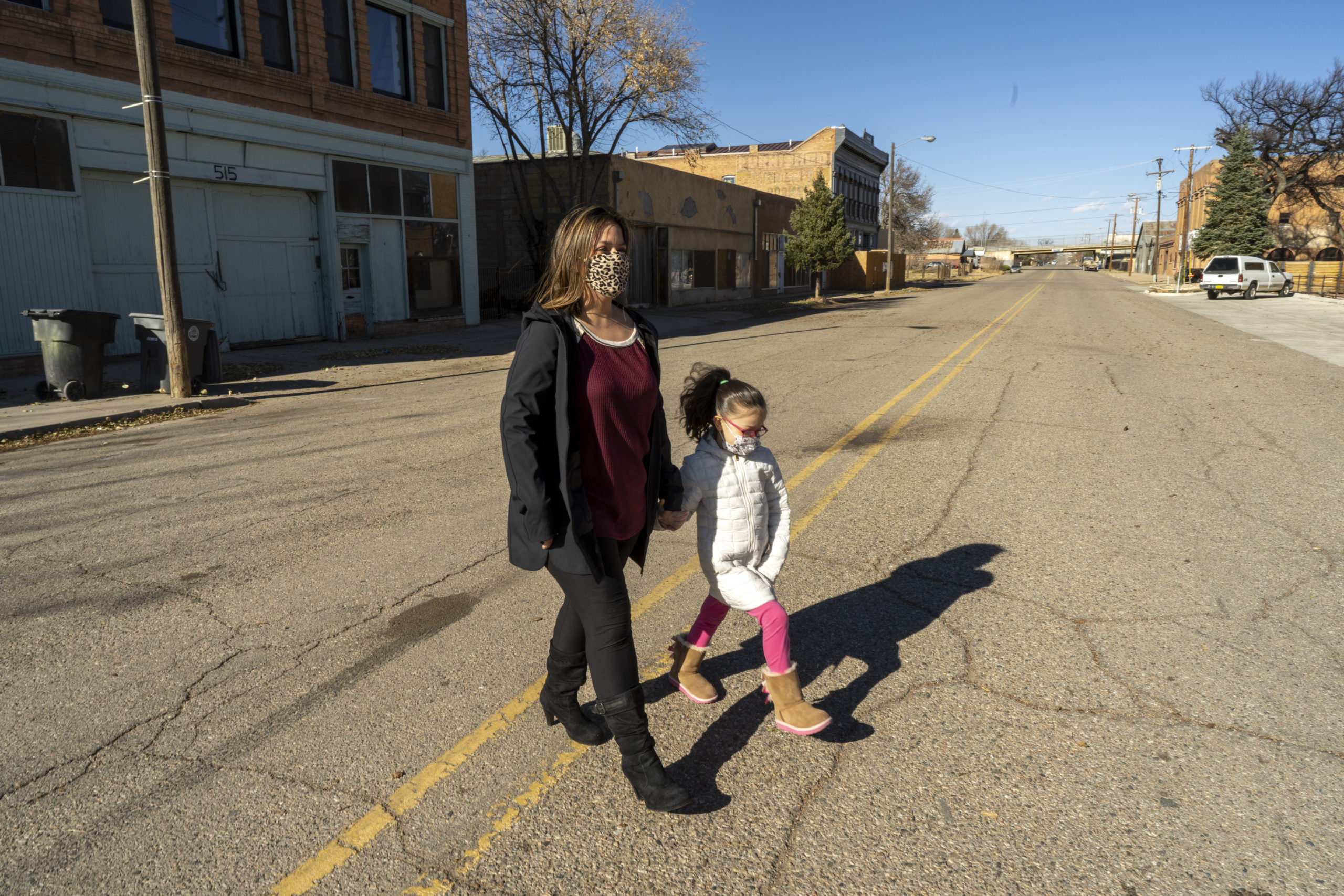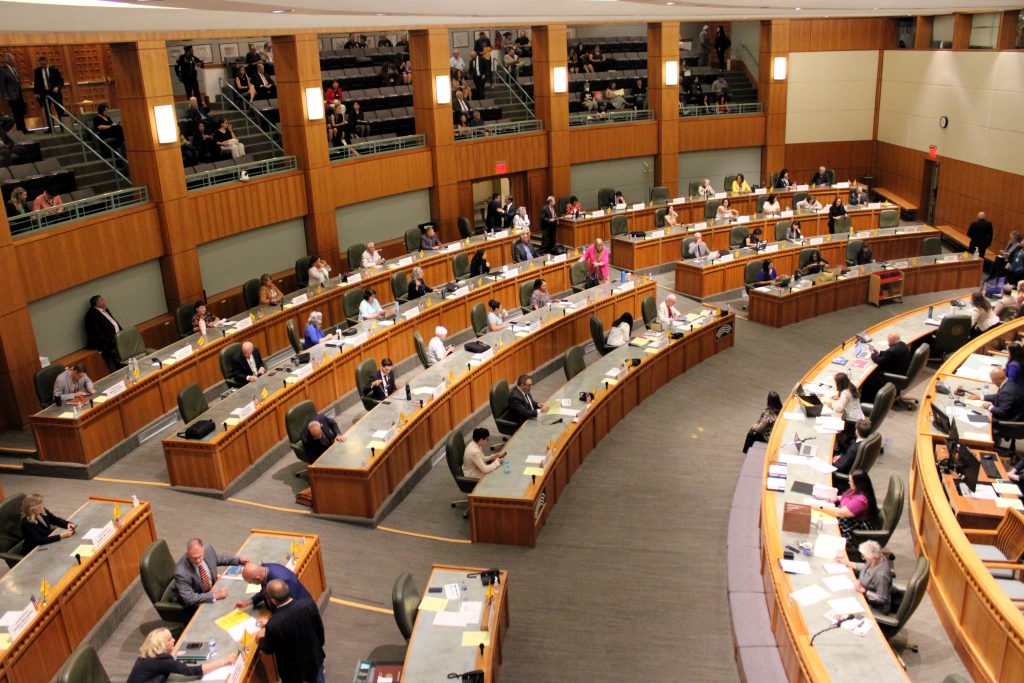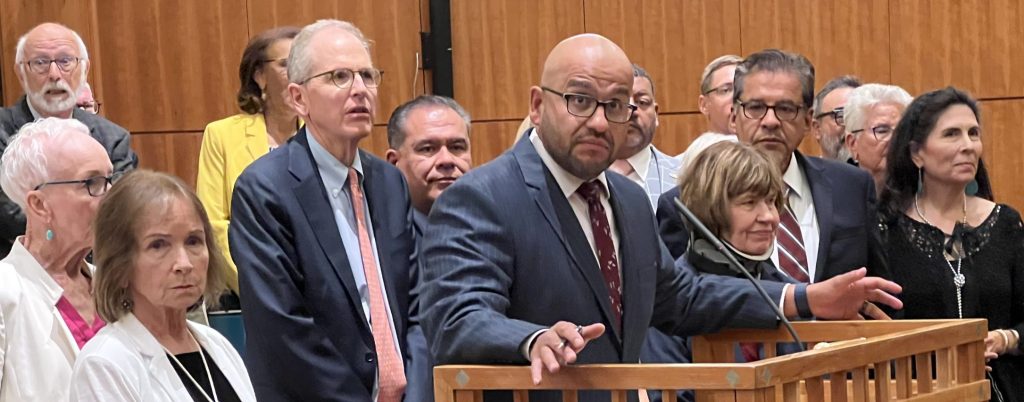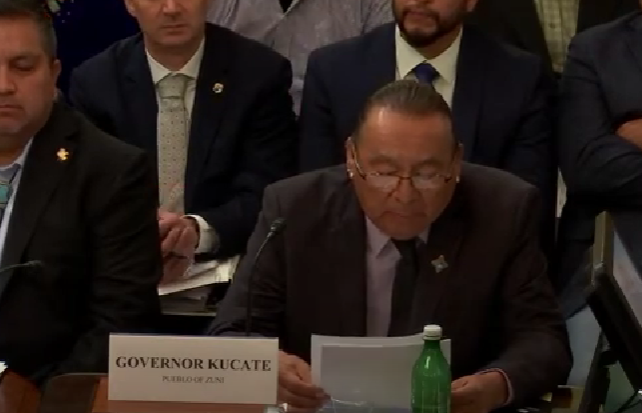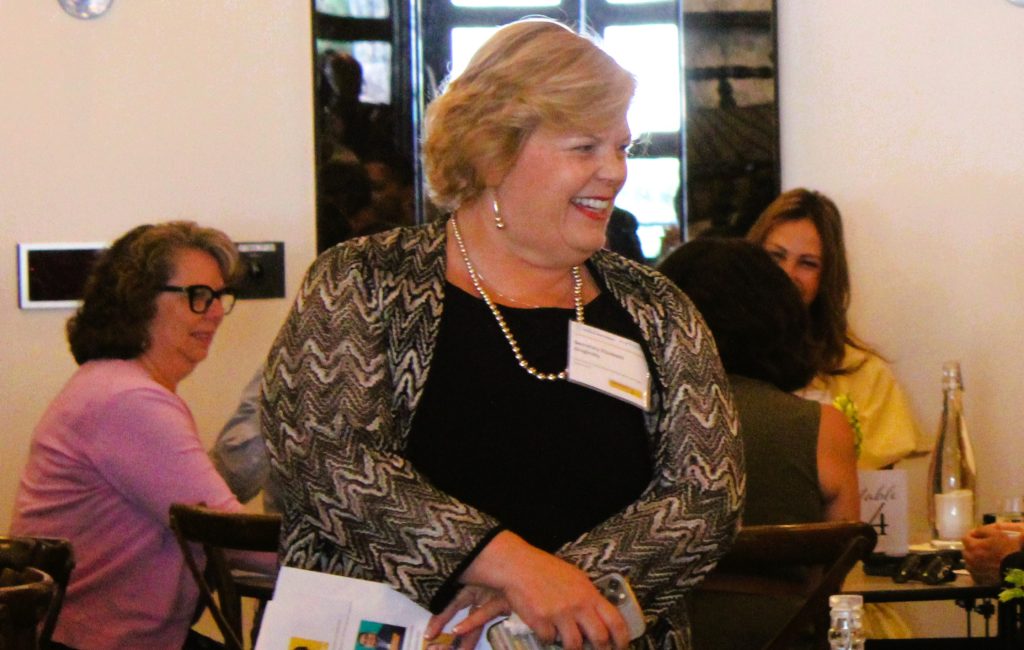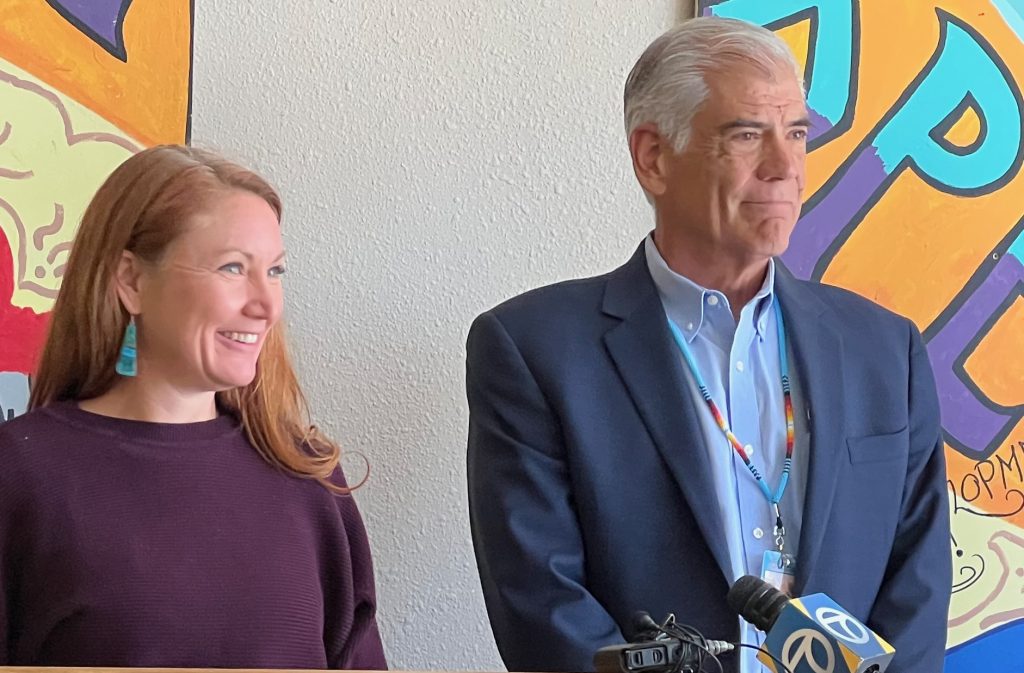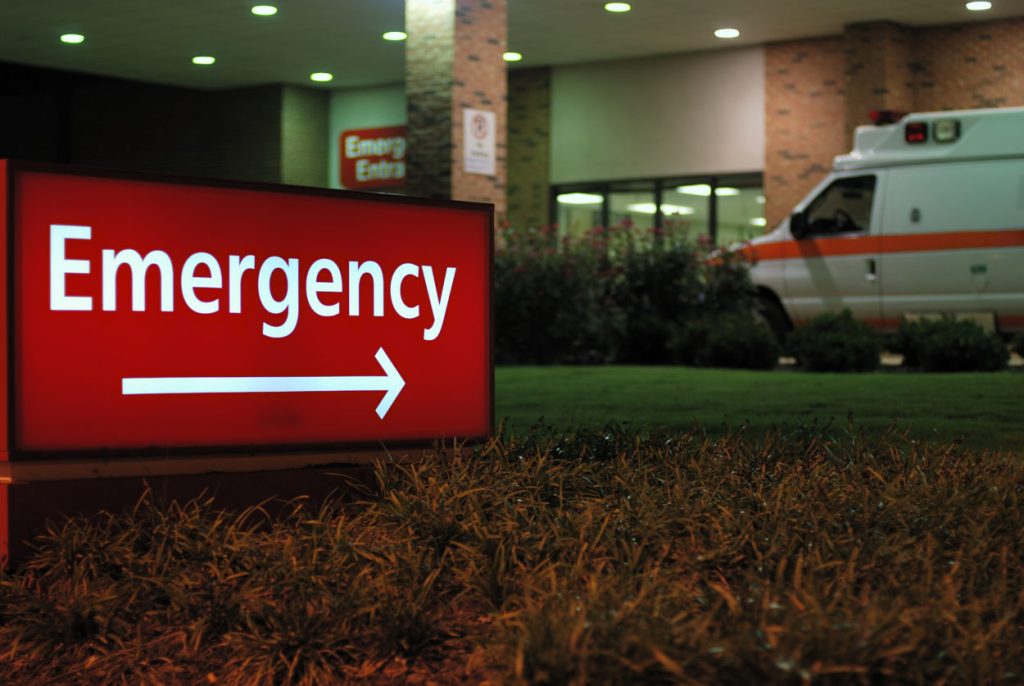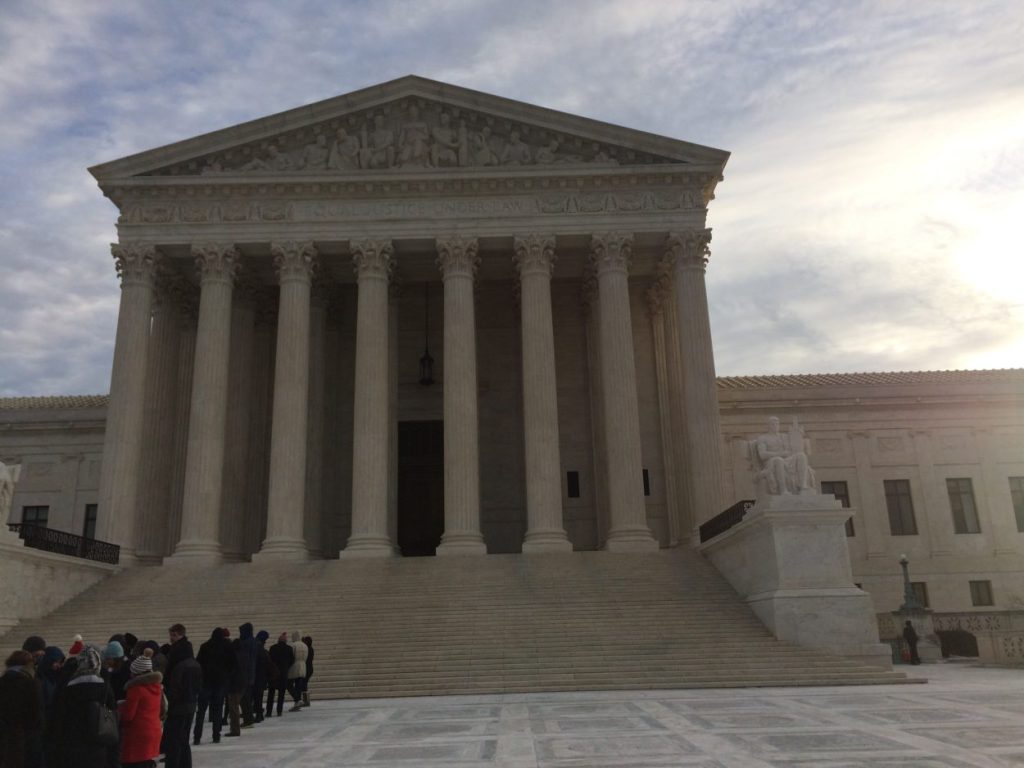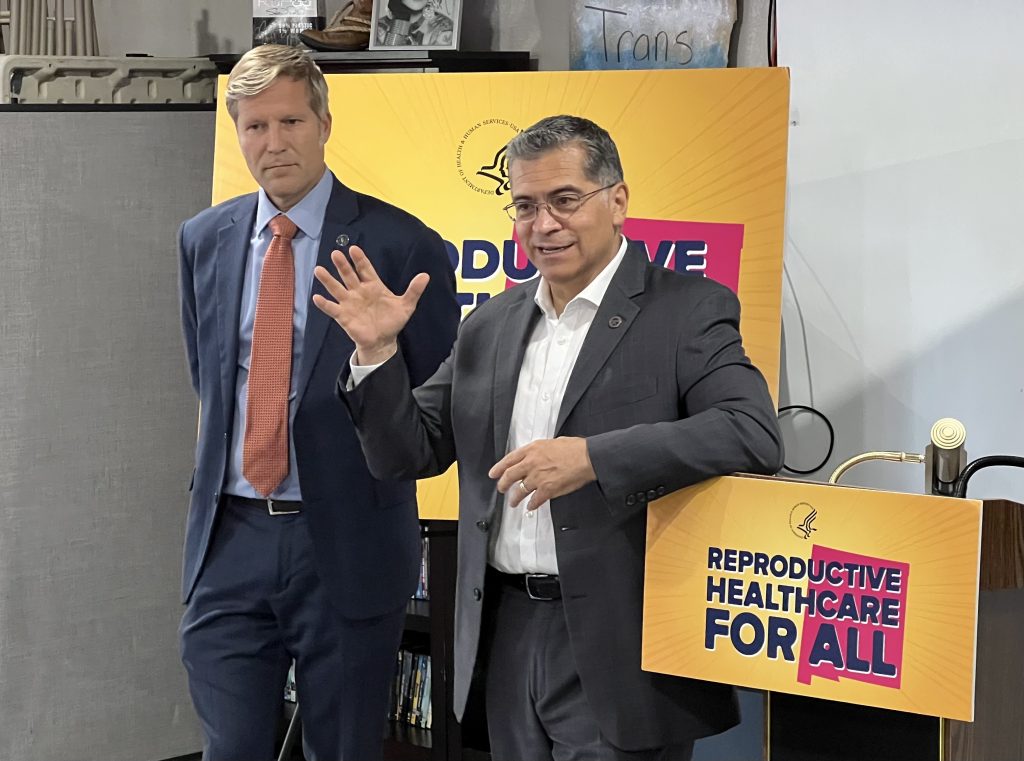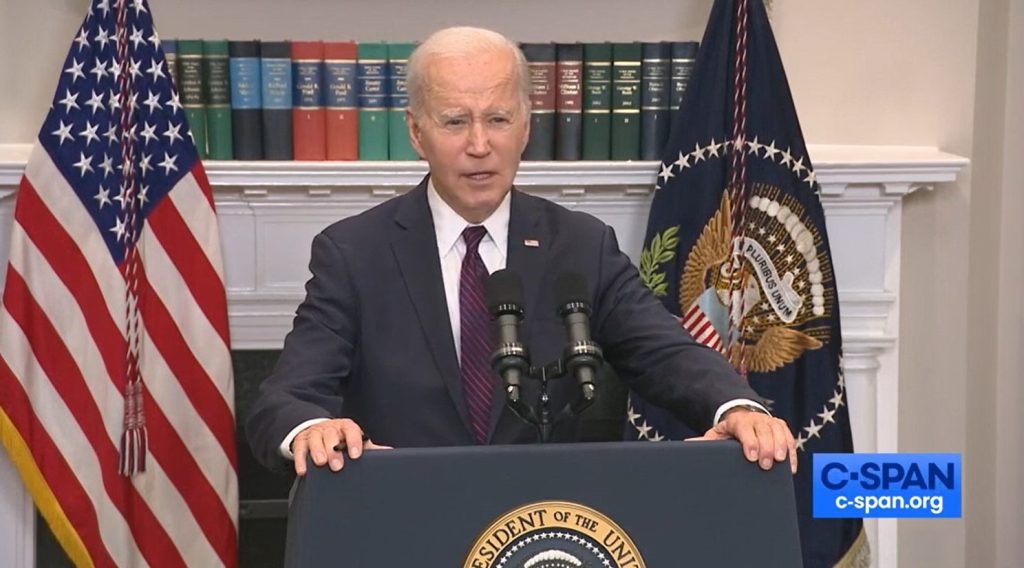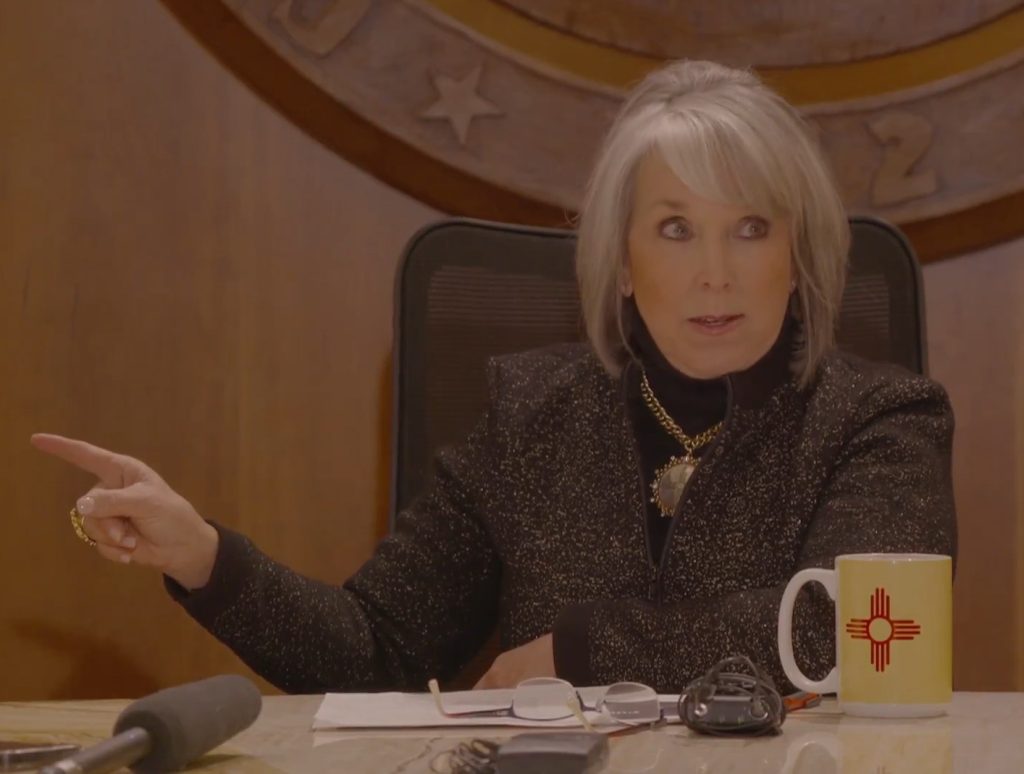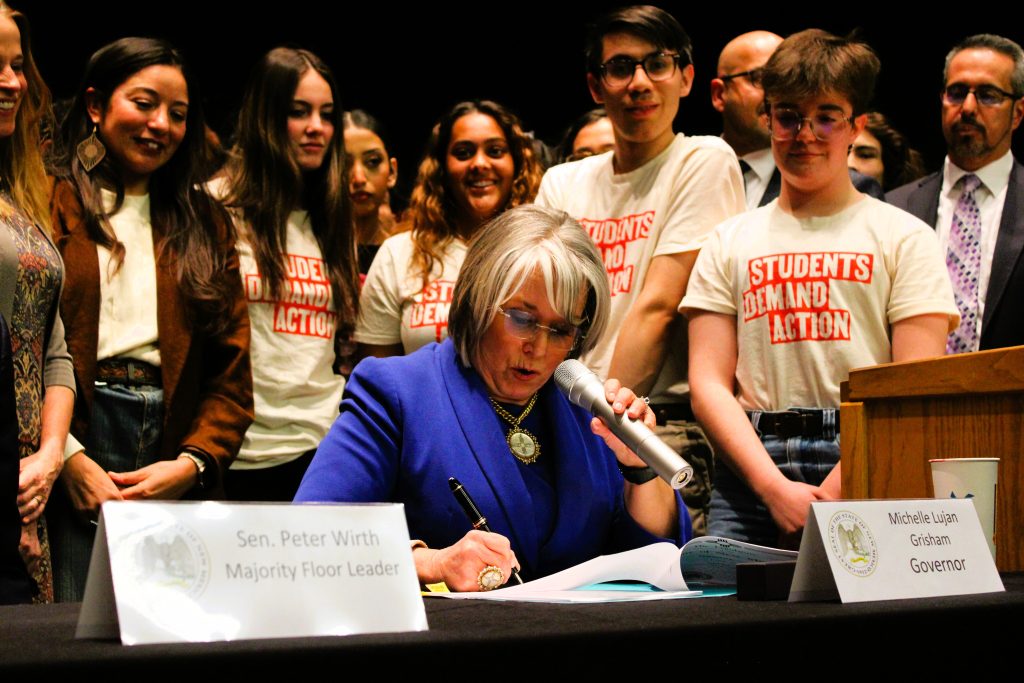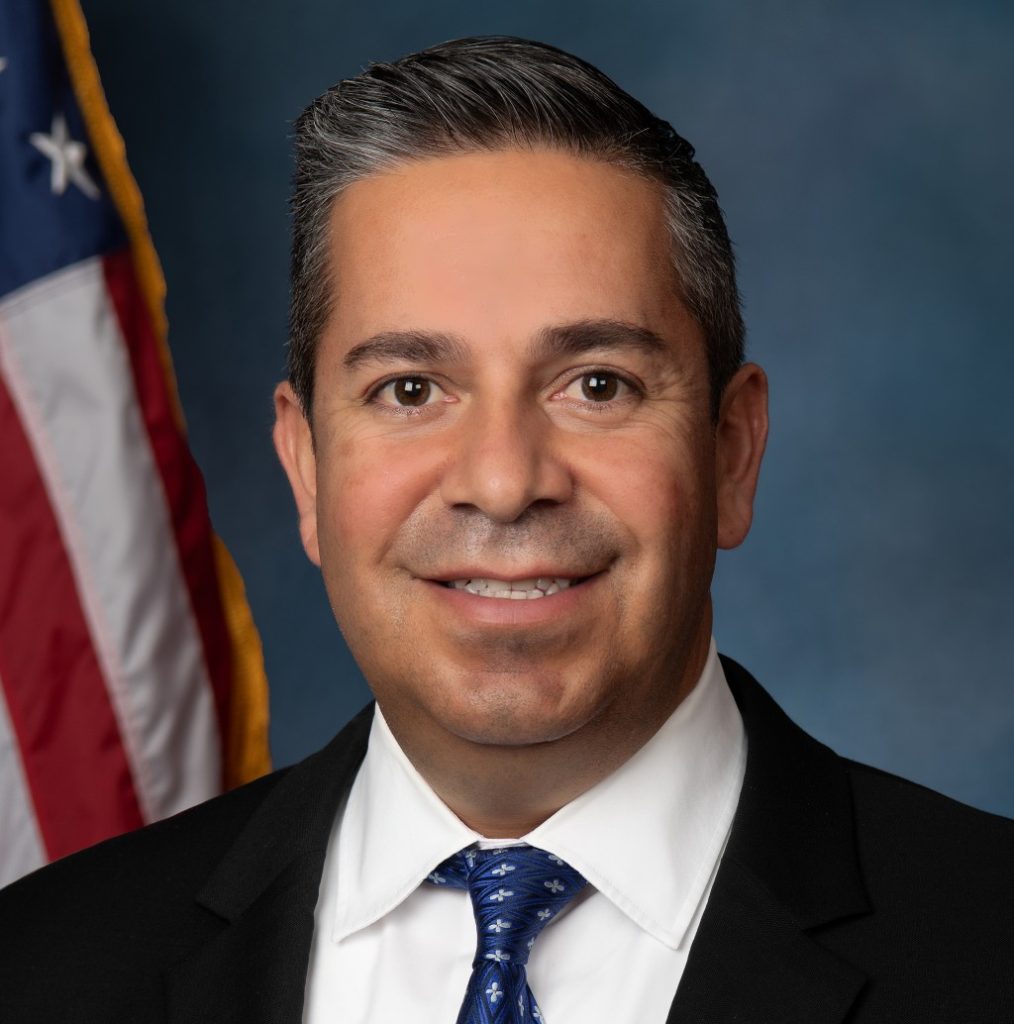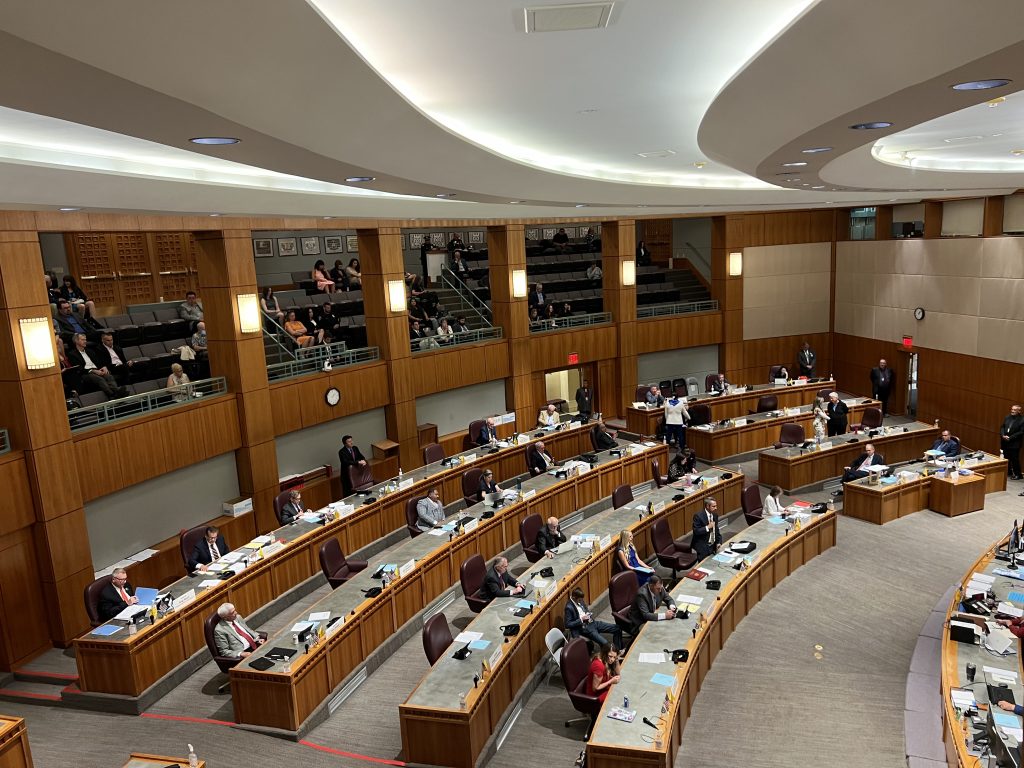LAS VEGAS, N.M. — “I don’t like school, because it’s not real,” declared Colin Atman, age 6. The first-grader had a good point.
Before the pandemic, Colin could dash around his Las Vegas school playground with his friends James and Damian, playing tag or a game called zombie. “I was, of course, more into zombie,” he clarified.
That all screeched to a halt in March, when COVID-19 arrived in New Mexico, Gov. Michelle Lujan Grisham halted in-person education, and Colin had to switch to virtual learning. On a recent Tuesday afternoon, he was still running around, with his hair gelled into a 4-inch mohawk and wearing a T-shirt decorated with glowing green skeletons. But it wasn’t the same. “You don’t get to play with your friends,” he said.
All public schools in New Mexico started off 100 percent remote for the fall semester, and so far in Las Vegas, the only public education option for the vast majority of kids is online. So these days Colin logs on to his school-issued laptop around 8:40 a.m. and the day ends at about 3 p.m., with some breaks in between.
Colin, like many youngsters, needs more physical movement than a day of computer learning provides, said his mom, Aja Currey, who has taught special education for the past decade.
During the course of a 20-minute conversation outside Currey’s school, Colin wriggled out of his mom’s arms, jumped atop a picnic table and scrambled up a short aspen tree. “I can see everything from here!” he shouted.
Kids are “having an extremely difficult time right now,” Currey said. “And the parents are having a difficult time as well.”
Currey’s experience as a parent in Las Vegas, a small town of 13,000 that lies about an hour east of Santa Fe, echoes the struggle of tens of millions of parents around the country who are juggling the newfangled dynamics of virtual learning with the economic demands of their jobs.
They have been fortunate on one score: To date, relatively few locals have been sickened by the novel coronavirus. As of Nov. 16, San Miguel County (pop. 27,000) had reported no deaths and only 291 confirmed cases, giving it a per capita infection rate well below the state’s average.
But here, as everywhere, fighting the contagion comes at a price, and young schoolchildren — and their parents — are paying a large one. With a few exceptions, the city’s two public school districts ended in-person instruction and don’t expect to bring kids back until after the New Year. Online school means that working parents are doing quadruple duty as employee, parent, teacher’s aide and hall monitor — or they’re leaving the kids with a relative, a friend or a day care, if they can afford it.
Currey sees it from multiple perspectives, as a parent, spouse and educator. She’s the special education coordinator at Río Gallinas School for Ecology and the Arts, a public charter that’s part of West Las Vegas Schools.
“It’s a juggling act,” Currey said. “This pandemic has been brutally hard for working parents with young children.”
It’s been hard on the children, too — pediatricians around the country are seeing depression and anxiety in kids that’s tied to COVID-19. Currey said that many kids, her son included, miss the classroom. “Even the kids that maybe didn’t really like school,” she emphasized.
Now Currey has to balance her job teaching students with her responsibility to supervise her son’s online education.
Some days, Currey works from home, and she splits Colin’s caretaking with her husband, Elsu Atman. But he’s got a job in carpentry, so he’s not always around the house. They send their youngest child, who’s about 18 months old, to a day care three days a week, but they can’t afford to spend another $500 a month for similar supervision for Colin. He used to be looked after by teachers during the school day, at no added cost, Currey pointed out.
On other days, Currey goes to her school building and teaches lessons from there: The students join via videoconference — and Colin tags along with his laptop. The school abuts another public elementary, and when he’s not doing schoolwork, Colin can easily conquer the fence and escape into its playground.
He gets the swings and the slides all to himself — but that’s not as fun as it sounds. “It’s boring, honestly,” he said. “There’s no kids.”
Struggles made worse
COVID-19 didn’t just shutter Las Vegas schools — it also put the brakes on an already struggling local economy. The city’s 2018 median household income was only $27,790, slightly less than half the national average, according to U.S. Census data. Over one-third of residents lived below the poverty line.
“It’s actually always been quite impoverished, and this has just exacerbated the situation already in our community,” said George Lyon, executive director of Samaritan House, a local nonprofit that provides food, housing assistance and other services for anyone in need. In the first six months of this year, the organization gave out twice as much food as it did during the first six months of 2019, he said.
Small businesses are also struggling. They’ve lost foot traffic, among other obstacles, and many have been forced to switch to online sales, which can be challenging. To help retailers reach customers, Main Street de Las Vegas, an economic development organization, has been sponsoring virtual “cash mobs”: Volunteers show up at a business and launch an online livestream to showcase the merchandise, explained Michael Peranteau, the nonprofit’s executive director. The events have drawn viewers from around the country and brought in nearly $50,000 in sales for the small businesses as of mid-October. They’re planning six more events during the weeks leading up to Christmas.
And with its Wild West aura and wealth of historic buildings, Las Vegas continues to be a destination for the movie and television industry. Just last week, the cast of “Roswell, New Mexico,” a science fiction TV show, descended on Las Vegas for two days of filming.
But other enterprises haven’t been as fortunate. At least three businesses — a restaurant, a bar and an art gallery — closed their doors for good, according to their owners and local media reports.
City coffers surviving
Although the total economic picture isn’t known yet, the pandemic hasn’t done significant harm to municipal revenues to date, Bill Hendrickson, the city’s community development director, told Searchlight. The city brought in about the same amount of gross receipts tax revenue between July and September of this year as it did during the same period last year, he said. Although the state’s public health orders forced some businesses to curtail operations, Hendrickson said people were still opening their wallets for all manner of things. “People were going out and buying up all the toilet paper, and you pay sales tax on toilet paper,” he noted.
And lodgers’ tax revenues from hotel and motel stays haven’t decreased as drastically as feared. The city expected to collect only $112,000 in lodgers’ tax revenue for the entire fiscal year, a dramatic decline from last year’s target of $377,000, according to budget documents. But Hendrickson said the city has already met its goal and bested it. At the end of October, just four months into the fiscal year, they’d already brought in $117,000, he said.
Some of the people staying in hotels have been medical workers or individuals who needed to quarantine after being exposed to or contracting COVID-19. The state Department of Health has been paying for some of their stays.
But, as Hendrickson pointed out, the revenue numbers could dip further in the future. “I would not jump out there and jump up and down and say ‘yay!’ yet,” he said.
Worries about ‘sponge years’
Local schools are in a similarly uncertain situation. Christopher Gutierrez, superintendent of the West Las Vegas Schools, said that even though the state’s regulations allowed him to bring some kids back to school, he decided to keep most of them home for the entire semester, just to be safe.
But he knows that’s not ideal — especially for young children.
“Do I wish we could bring kids back? Oh, of course,” said Gutierrez, who oversees the education of about 1,550 children. “Those that I’m more worried about would be the little ones, from pre-K to third or fourth grade. Those are the sponge years. Those are the years they’re taking information in so, so much.”
Both Gutierrez’s district and Las Vegas City Schools, which covers the eastern part of town and some rural areas, have been providing technology to students to ease the burden of learning from home. Students all across town were given laptop computers, and both districts are helping families connect to the internet.
Gutierrez said his district also loaned out 150 internet hot spots, which provide connectivity through cell phone networks. But those connections tend to lag when more than two people use the same hot spot at the same time. So he reached out to a local internet service provider, DesertGate Internet, and discussed the possibility of using the district’s IT department to help install more sophisticated technology, which would give students more stable internet access.
“I want to get them more of a permanent fix, because we don’t know how long we’re going to be on this,” Gutierrez said.
Ron Doss, co-founder of DesertGate, said he was happy to hear from Gutierrez — and could use the help. His company’s three technicians, along with Doss and a fellow co-founder, have been working around the clock since COVID-19 arrived; nowadays they’re booked nearly a month in advance. “We were just floored at the volume of people desperately searching for internet access,” Doss said. Most of the new customers needed the internet for online school.
Gutierrez’s kids need more than an internet connection, however. Because of the area’s high poverty rate, schools have been a major source of food — every student in the district is eligible for free breakfasts, snacks and lunch. So these days, “grab and go” meals are available for pickup around town or are delivered to students who live in more remote areas, he said.
Gutierrez knows he needs to be flexible with his families’ schedules: While some kids can log on during the official school day, others might not be able to get online until the evening. “They’re not going to be dinged just because work isn’t turned in right away,” he said. About 80 to 85 percent of students are present during the live instruction, he said, and the remainder log on later to watch the video lessons and complete the assignments.
In a sense, Gutierrez’s district was lucky — for years, the schools had been building the technological infrastructure that would make the transition to online learning possible. By the fall of 2017 the district had purchased laptops for every student. And in the summer of 2019, some teachers started to learn Google Classroom, an online suite of tools that teachers around the country, including those in Las Vegas, are now using for virtual learning.
Summing up success
Even with the advance preparation, however, the transition to online learning was a challenge. Andrea Tafoya saw it firsthand. Tafoya teaches first grade at Luis E. Armijo Elementary School, which is in Gutierrez’s district, and is the mother of four kids, one of them in second grade.
Like Currey, the special education teacher, Tafoya said it isn’t always easy to juggle responsibilities. At the beginning it was especially difficult, she said. She’d be trying to teach, and her 7-year-old daughter, Faith, would keep interrupting to ask questions.
“It’s easy to be like, hey, Mom’s in the next room. I’m going to go ask her to help me,” Tafoya said. She’s had to teach her daughter to be more self-sufficient.
Still, it’s gone well, she added. She’s been pleasantly surprised by how much her daughter has been able to thrive, despite the logistical challenges. The family is also fortunate, she added: Their home has a good internet connection, and Faith knew how to use the computer before COVID-19 arrived.
“I really thought she was going to struggle with online learning, but she hasn’t,” Tafoya said. Faith recently had to tackle the challenge of adding two- and three-digit numbers together, a real head-scratcher — and she’s doing well. “She hasn’t even really skipped a beat.”

